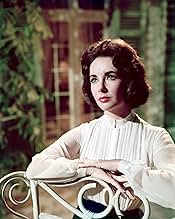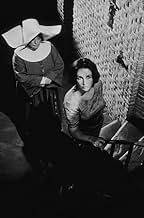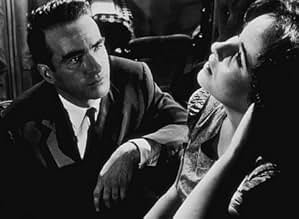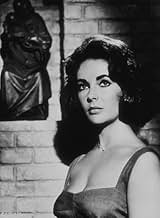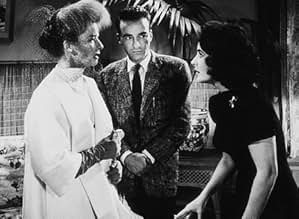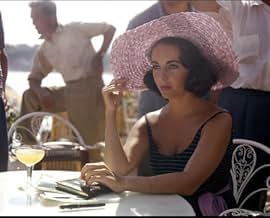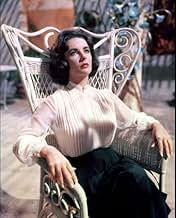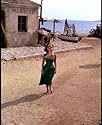PUNTUACIÓN EN IMDb
7,5/10
18 mil
TU PUNTUACIÓN
A un cirujano se le asigna el caso de una joven cuya tía quiere que sea lobotomizada para encubrir un secreto familiar.A un cirujano se le asigna el caso de una joven cuya tía quiere que sea lobotomizada para encubrir un secreto familiar.A un cirujano se le asigna el caso de una joven cuya tía quiere que sea lobotomizada para encubrir un secreto familiar.
- Nominado para 3 premios Óscar
- 4 premios y 7 nominaciones en total
Sheila Robins
- Dr. Hockstader's Secretary
- (as Sheila Robbins)
Erik Chitty
- Asylum Inmate
- (sin acreditar)
Grace Denbeigh-Russell
- Asylum patient
- (sin acreditar)
Brenda Dunrich
- Nurse
- (sin acreditar)
Eddie Fisher
- Street Urchin
- (sin acreditar)
Anthony Lang
- Inmate
- (sin acreditar)
Aileen Lewis
- Nurse
- (sin acreditar)
Argumento
¿Sabías que...?
- CuriosidadesAccording to author Garson Kanin in his memoir "Tracy and Hepburn," Katharine Hepburn was reportedly so furious at the way Montgomery Clift was treated by producer Sam Spiegel and director Joseph L. Mankiewicz during filming that, after making sure that she would not be needed for retakes, she told both men off and actually spat at them (although it remains unclear just which one of the two she spat at, or if she spat at both).
- PifiasAlthough set in 1937, costumes, hairstyles and makeup worn by Dame Elizabeth Taylor are all contemporary in 1959.
- Citas
Catherine Holly: Is that what love is? Using people? And maybe that's what hate is - not being able to use people.
- ConexionesEdited into This Is It (2009)
Reseña destacada
This screen version, by Joseph L Mankiewicz, of Tennessee Williams' play isn't as highly thought of as it should be. It's not a classic and on occasions it comes over as crude and stilted, but it also has many fine things going for it. Although he never really opens it out, Mankiewicz gives it a fluency that isn't at all theatrical and although he often films scenes intimately and between only two characters, he ensures it is photographed and cut in a very cinematic fashion.
Unfortunately, one of the two people on screen during these 'cinematic' sequences is Montgomery Clift who is at his worst here. It was after his accident and he looks as if he's in pain. When he walks it's as if there is a board up his back and he talks as if out of the side of his mouth. Luckily, with him in these scenes is either Elizabeth Taylor or Katharine Hepburn or both and when they are on screen you don't pay too much attention to Clift.
Dilys Powell said Elizabeth Taylor was born to play Tennessee Williams and she was right. Indeed this may be her best performance after "Virginia Woolf". Catherine's lines don't have the kind of poetry in them that Violet Venable's does but Taylor finds a poetry of her own in her readings. She builds on her long speech at the end and is very moving, even if Mankiewicz can't resist 'showing' us, in flashbacks, what Taylor is telling us, as if he doesn't trust an audience to sit still and just listen to Taylor. (They would have to in the theatre).
As Violet, Hepburn has the showier part and she milks it for all it's worth. It's a great piece of acting because Violet never seems to be acting, though she tends to think of her life as a kind of performance, something she has passed on to her homosexual son, Sebastian. (If the old adage, 'my mother made me a homosexual', has any validity you don't have to look any further than here). She enters from above, descending in her small baroque lift, and Hepburn can see the comic potential in such an entrance. Moments later, however, she is recounting how the sea-turtles were devoured by flesh-eating birds in the Galapogos, and you can see just how dangerously unstable this woman really is.
Any film that has acting of this calibre automatically qualifies as worth seeking out, (you forgive the lame work of Clift and Gary Raymond and draw a blind over Mercedes McCambridge, though Albert Dekker is very fine), but this qualifies on other grounds; as one of the better Tennessee Williams adaptations, (he co-wrote it with Gore Vidal), as a flawed, dated but strangely fascinating example of how Hollywood viewed homosexuality at the time, (negatively, naturally, but any face, no matter how horribly distorted, so long as it was in the public gaze, was better than no face at all), and as a serious addition to the Joe Mankiewicz canon.
Unfortunately, one of the two people on screen during these 'cinematic' sequences is Montgomery Clift who is at his worst here. It was after his accident and he looks as if he's in pain. When he walks it's as if there is a board up his back and he talks as if out of the side of his mouth. Luckily, with him in these scenes is either Elizabeth Taylor or Katharine Hepburn or both and when they are on screen you don't pay too much attention to Clift.
Dilys Powell said Elizabeth Taylor was born to play Tennessee Williams and she was right. Indeed this may be her best performance after "Virginia Woolf". Catherine's lines don't have the kind of poetry in them that Violet Venable's does but Taylor finds a poetry of her own in her readings. She builds on her long speech at the end and is very moving, even if Mankiewicz can't resist 'showing' us, in flashbacks, what Taylor is telling us, as if he doesn't trust an audience to sit still and just listen to Taylor. (They would have to in the theatre).
As Violet, Hepburn has the showier part and she milks it for all it's worth. It's a great piece of acting because Violet never seems to be acting, though she tends to think of her life as a kind of performance, something she has passed on to her homosexual son, Sebastian. (If the old adage, 'my mother made me a homosexual', has any validity you don't have to look any further than here). She enters from above, descending in her small baroque lift, and Hepburn can see the comic potential in such an entrance. Moments later, however, she is recounting how the sea-turtles were devoured by flesh-eating birds in the Galapogos, and you can see just how dangerously unstable this woman really is.
Any film that has acting of this calibre automatically qualifies as worth seeking out, (you forgive the lame work of Clift and Gary Raymond and draw a blind over Mercedes McCambridge, though Albert Dekker is very fine), but this qualifies on other grounds; as one of the better Tennessee Williams adaptations, (he co-wrote it with Gore Vidal), as a flawed, dated but strangely fascinating example of how Hollywood viewed homosexuality at the time, (negatively, naturally, but any face, no matter how horribly distorted, so long as it was in the public gaze, was better than no face at all), and as a serious addition to the Joe Mankiewicz canon.
- MOscarbradley
- 1 nov 2006
- Enlace permanente
Selecciones populares
Inicia sesión para calificar y añadir a tu lista para recibir recomendaciones personalizadas
Detalles
- Fecha de lanzamiento
- Países de origen
- Idioma
- Títulos en diferentes países
- De sobte, l'últim estiu
- Localizaciones del rodaje
- Begur, Girona, Catalonia, España(village and old castle scenes)
- Empresas productoras
- Ver más compañías en los créditos en IMDbPro
Taquilla
- Presupuesto
- 3.000.000 US$ (estimación)
- Recaudación en todo el mundo
- 9830 US$
- Duración1 hora 54 minutos
- Color
- Relación de aspecto
- 1.85 : 1
Contribuir a esta página
Sugerir un cambio o añadir el contenido que falta

Principal laguna de datos
By what name was De repente, el último verano (1959) officially released in India in English?
Responde


